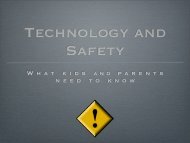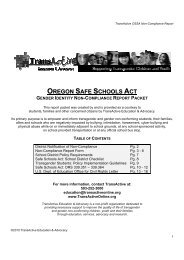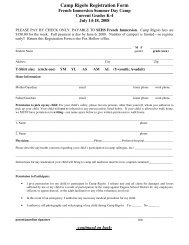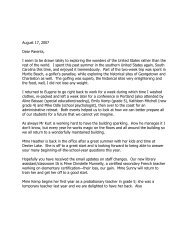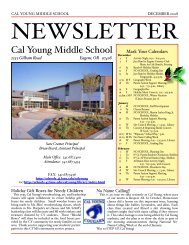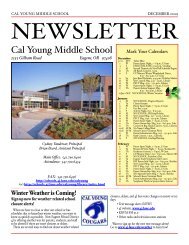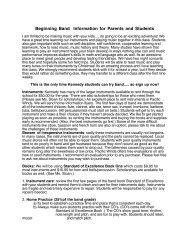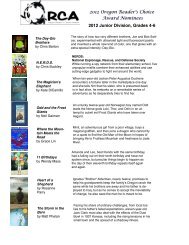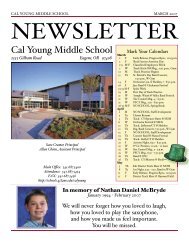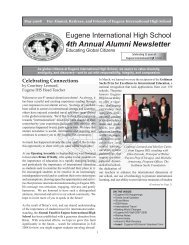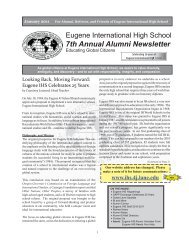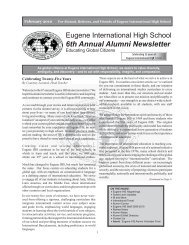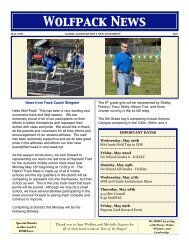Charlemagne Parent Handbook - 4J School District
Charlemagne Parent Handbook - 4J School District
Charlemagne Parent Handbook - 4J School District
You also want an ePaper? Increase the reach of your titles
YUMPU automatically turns print PDFs into web optimized ePapers that Google loves.
may select a class schedule. A bus transports students choosing to have class at the end of the<br />
regular school day.<br />
Performances<br />
Singing and acting are effective ways for children to learn and use French therefore children<br />
perform many times throughout the year. Preparing for performances provides opportunities<br />
for practicing and perfecting skills. Classroom performances are part of instructional activities.<br />
These take place during the school day, often for audiences of peers and parents. <strong>School</strong><br />
performances in the evening demonstrate skills and knowledge for parents and interested<br />
community members.<br />
Evening and public performances are optional. Children who cannot attend performances may<br />
participate in the preparation of props, scenery, and group parts. <strong>Parent</strong>s are welcome to<br />
volunteer tasks they would be willing to do to help with e.g., set-up, transportation, and clean up.<br />
Each successful performance is the result of many people working in the background.<br />
Release Time for Special Instruction<br />
Children may be released from school instruction to attend special instruction as arranged by<br />
their family. Written permission from parents is required for students to leave the school.<br />
SUPPORT PROGRAMS<br />
Support Services Team<br />
A support services team comprised of the school psychologist, speech and language specialist,<br />
school principal, and individual classroom teachers meet as needed to discuss any concerns staff<br />
or parents have regarding specific students. The purpose of the meetings is to address student<br />
needs not being served in the regular program. Special testing, program adjustments and<br />
behavioral plans may be developed to meet these needs. All discussions and plans are developed<br />
with parent input and approval.<br />
Speech and Language Specialist<br />
The speech and language program provides services at school such as hearing, speech and<br />
language testing. An initial hearing screening is completed for all kindergarten children and<br />
students new to the district. Speech and language screening is completed upon referral from<br />
either a parent or teacher. If the screening indicates that the child needs speech and language<br />
support, the specialists will meet with parents to discuss findings and develop an Individual<br />
Educational Plan (IEP) for the child.<br />
Resource Room – Mildly Handicapped Learner Education<br />
Teachers or parents may refer a child for testing if they believe that the student is not making<br />
sufficient progress in the regular classroom program. Students who meet the criteria for mildly<br />
handicapped learner receive services in the areas identified as deficient. These areas may be one<br />
or more of the following: reading, math, and writing. Before a program is developed, parents<br />
meet with the school psychologist, resource room teacher, teachers, and principal to discuss the<br />
test results, review the options and the proposed Individual Education Plan (IEP), and give<br />
permission for the child to be served by the Resource Room teacher.<br />
TAG – Talented and Gifted<br />
The program for Talented and Gifted students is designed to meet the special needs, interests,<br />
and abilities of identified children. <strong>Parent</strong>s and/or teachers may request a child be evaluated for<br />
inclusion in the program. Students must score at or above the 97 th percentile on either a test of<br />
mental ability (intellectually gifted) or an achievement test in reading or math (academically<br />
talented). These scores are used in conjunction with other work to determine eligibility.<br />
Students who meet criteria for TAG will have differentiated instruction provided in the regular<br />
12



